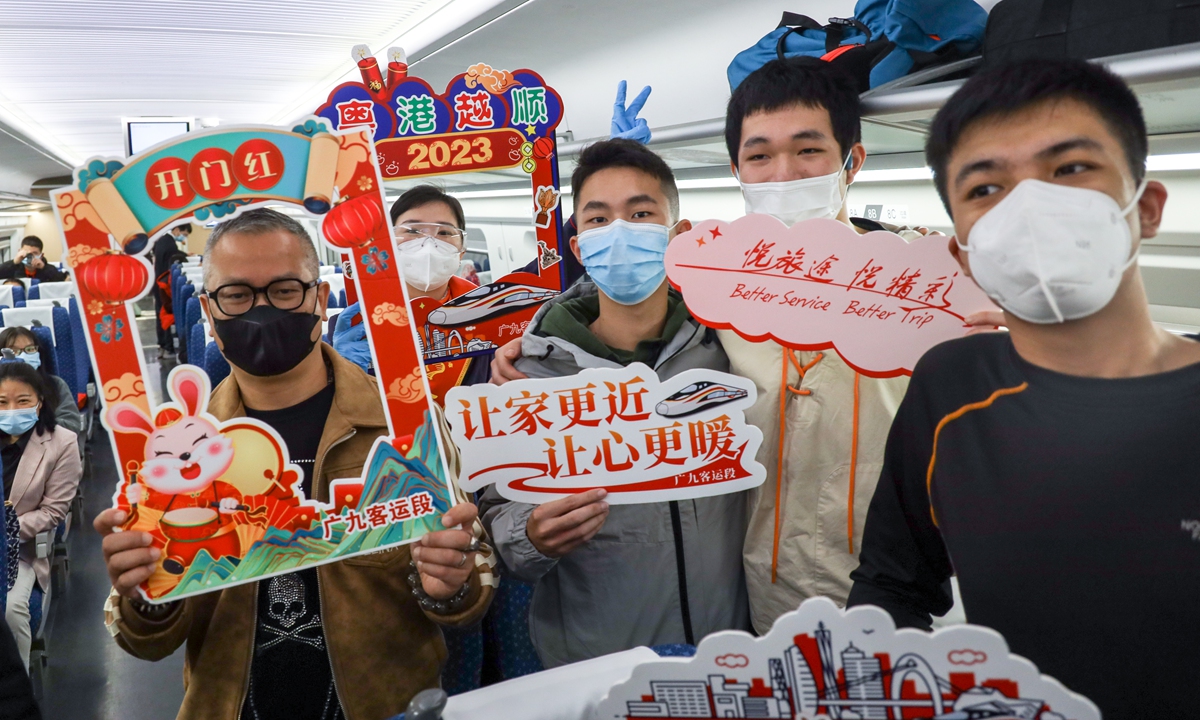
Passengers take G6551, the first high-speed train from Guangzhou, South China's Guangdong Province, to the Hong Kong Special Administrative Region, as Hong Kong's high-speed rail link to Guangzhou resumes services on January 15, 2023, after three years of border closure due to the COVID-19 pandemic. Photo: VCG
Hong Kong's high-speed rail link to Guangzhou resumed services on Sunday after three years of border closure due to the COVID-19 pandemic, a move that is of great significance for holiday-goers and family reunions in the lead-up to Chinese Lunar New Year.
An air of joy was on the faces of passengers from both sides, some looking forward to shopping in Hong Kong, some yearning for family reunions, and some for dealing with business affairs, or just hanging around to visit the city. "Resumption of the rail link is very good news for us. I'm used to getting on the train to Chinese mainland cities and seeing my grandma, who now lives in Guangzhou," a young man named Chen Zihao from Hong Kong told the Global Times.
The passengers, who were on the first northbound and southbound trains on the Guangzhou-Shenzhen-Hong Kong high-speed rail line, both received warm welcomes early on Sunday from station workers.
The first high-speed train G5607 left Shenzhen North Railway Station at 7:24 am and reached the Hong Kong West Kowloon high-speed railway platform at 7:42 am. Officials from the Hong Kong Special Administration Region (HKSAR) authorities, including the Hong Kong Tourism Board (HKTB), came to the station to welcome the passengers and presented souvenirs prepared by the HKTB.
The first train from Guangzhou to Hong Kong departs the Guangzhou East Railway Station at 7:58 am. Guangzhou East Railway Station is a new station in the early stages of the high-speed rail line's resumption. Previously, trains from West Kowloon Station could only go to Guangzhou South Station directly.
Passengers will be able to travel to Shenzhen, Dongguan and Guangzhou in the initial stages of the resumption, with an initial daily quota of 5,000 tickets each heading north and south. There will be 38 trains departing from Hong Kong daily, Hong Kong media reported.
Operations and passenger demand will be reviewed after the reopening to see if more tickets and more trains, including long-haul ones, need to be added, according to HKSAR Secretary for Transport and Logistics Lam Sai-hung.
Quarantine-free travel between Hong Kong and the Chinese mainland, which resumed last Sunday, is a long-awaited milestone for both places, especially for Hong Kong's travel agencies, enterprises and government, which are yearning for the return of mainland travelers to boost their economic development.
"The border reopening was much anticipated and it's inspiring for us. Previously, we thought Hong Kong's economy in 2023 would face challenges because of geopolitical tussles and the Hong Kong dollar being pegged against the US dollar, thus interest rates in Hong Kong would be on the rise," HKSAR Financial Secretary Paul Chan Mo-po told the Global Times in
an exclusive interview.
But after the reopening of the border, there is increased positivity in Hong Kong society, which is going to propel the rapid recovery of the city's economy. Travel was made easy for people from both the mainland and Hong Kong, so business trips can now be resumed along with tourism. Retail trade will also greatly benefit from the border reopening, Chan said.
Driven by growing optimism about the city's economic development following the border reopening, the public's satisfaction of the regional government's continuous efforts to promote economic development has increased by 0.12 points to 2.69 out of 5, according to a survey on Public Satisfaction with the Chief Executive, Secretary and HKSAR Government by the Hong Kong Research Association.
The HKSAR government is expected to roll out more preferential policies to attract visitors, including activities during the Chinese New Year, and more activities including concerts and art exhibitions are also scheduled in March, according to an official from the HKTB.
Demand to travel will be relatively strong as the Spring Festival is approaching.
To facilitate cross-border travel for family reunions in the festival, the daily quota at checkpoints will be increased by 15,000 to 65,000 each way from January 18 and January 21, the Chinese Lunar New Year's eve, the HKSAR government noted on Saturday.
The daily one-way quota for drivers and passengers of private cars and cross-boundary hire car services on the Hong Kong-Zhuhai-Macao Bridge will double to 2,000 for the same period.
The opening hours of the West Kowloon station will be the same as before the closure, from 6:30 am to 11:30 pm, with no need to reserve. Ticketed passengers only need to hold valid tickets and a negative nucleic acid test report within 48 hours to travel between the two places.




